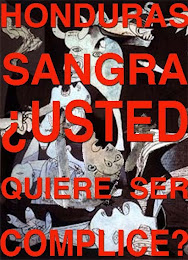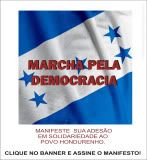Erros Graves no Reporte Oficial da Biblioteca do Congresso dos EUA
Contundente carta de distinguida professora de ciencias sociais da Universidade da California em Berkeley, Rosemary A. Joyce, à direção da Biblioteca do Congresso norteamericano em referencia ao Reporte oficial dessa instituição sobre a constitucionalidade do golpe de estado em Honduras de 20 de junho passado.
A redatora do "estudo" convertido em Reporte Oficial da Ms. Norma C. Gutierrez, em nome da Biblioteca do Congresso dos EUA, fundamentou todo o seu estudo em declarações de Guillermo Pérez-Cadalso, uma testemunha ao Comite do Congresso, declarado simpatizante do governo golpista de Honduras.
A carta contesta categoricamente as conclusões baseadas em suposta constitucionalidade da remoção do Presidente Zelaya pelo fato da redatora ter conscientemente suprimido outros estudos de catedraticos norteamericanos e espanhois sobre o tema e ainda suprimindo uma importantissima declaração da Suprema Corte Hondurenha emitida em 7 de maio de 2003 que proibe o Congresso de interpretar a Constituição como o fez no dia do Golpe de Estado de 28 de junho passado.
A professora alem disso salienta que o Congresso Hondurenho tambem errou no procedimento da sessão quando foi deliberado e decidido pela suposta inconstitucionalidade do Presidente Zelaya. Diz a Constituição que a sessão deveria ser "extraordinaria" e não uma sessão normal na qual o processo foi discutido. Diz a Regulamentação do Congresso Hondurenho que mesmo em uma sessão extraordinaria não pode ser incluida pauta legal sem antes ter sido anunciada. Logo, a sessão na qual Zelaya foi achado culpado foi ilegal, fora da regulamentação do Congresso da nação Hondurenha. A explicação da pauta da interpretação da Constituição NÃO estar na agenda supõe-se talvez pelo fato dos membros do Congresso saberem que estariam indo contra o decreto da Corte Suprema de 7 de maio de 2003 que proibia ao Congresso deliberar e decidir sobre interpretação da Constituição.
Quer dizer: alem da pauta não estar na agenda da sessão extraordinária como deveria estar por obrigação, o Congresso em seção extraordinaria interpretou a Constituição contra o decreto do Supremo.
Essas são apenas duas das refutações da professora na carta.
Marcos Rebello
Assessor Politico e membro comunidade diplomatica
.
Library of Congress Report on Honduran Coup Filled with Flaws
Written by Dr. Rosemary Joyce Friday, 25 September 2009.
The following letter was sent to the Library of Congress regarding the very serious errors in the report issued in their name yesterday.
Subject: Serious errors of fact in CRS LL File No. 2009-002965 on Honduras
From: "Rosemary A. Joyce"
Date: Fri, September 25, 2009 12:49 am
To: jbil@loc.gov
crsdirector@crs.loc.gov
Dear Librarian Billingsley and Director Mulhollan,
I write to bring to your attention serious errors of fact in a Congressional Research Service report written by Ms. Norma C. Gutierrez. Given the damage this erroneous report has already done as it circulates in Honduras and the US, I urge you to immediately issue a public correction and withdraw the report, notifying members of Congress that it is unreliable and based on faulty courses and inaccurate information.
Entitled "HONDURAS: CONSTITUTIONAL LAW ISSUES" and dated August 2009, the report was released by Congressman Schock of Illinois today.
It has now been established unequivocally that Ms. Gutierrez' produced a fatally flawed report.
There are four problems with Ms. Gutierrez' analysis:
(1) She cites a single Honduran legal analyst as a source of personal communications "confirming" conclusions she draws. Her source is a known supporter of the de facto regime in Honduras, Guillermo Pérez-Cadalso, who testified on behalf of the de facto regime in July's hearings in the US Congress.
This is not a disinterested source. There are numerous Honduran law professors, as well as constitutional law authorities in the US and Spain, on record in writing finding the Honduran Congress exceeded its legal authority in claiming to remove President Zelaya from office on June 28. None of these authorities is cited.
(2) Ms. Gutierrez, rather than analyze the arguments made by the Honduran Congress, as the questions she was asked would require, creates her own novel theory: that the Honduran Congress used a constitutional power given it to interpret the Honduran Constitution so as to justify its removal of President Zelaya.
Specifically, she suggests that the Congress must have interpreted its Constitutional authority to "disapprove" of the actions of a president, extending the definition of "disapproval" to include "removal from office".
Such a claim was not, however, actually made by the Honduran Congress in its June 28 actions. This is a post-hoc rationalization for their actions proposed by Ms. Gutierrez, apparently with guidance from Mr. Pérez-Cadalso, who is cited as confirming this rationalization in a footnote citing a phone conversation.
(3) In fact, on May 7, 2003, the Honduran Supreme Court had nullified the claimed power of the Congress to interpret the Constitution. Thus, it is not surprising that the Honduran Congress made no such claim on June 28, since they no longer could assert such authority, which the Supreme Court had rejected.
(4) Even during the period when the Honduran Congress acted under the belief it had the power to interpret the Constitution, it was bound by procedures that required it to explicitly note that it was interpreting the constitution, and to define the circumstances of the definitions they proposed.
This did not happen on June 28, almost certainly because no such claim was then being made, because the Congress was aware of the May Supreme Court ruling invalidating this claimed power.
In addition, the Honduran congressional session on June 28 was not the kind of ordinary session that had been defined as allowing constitutional interpretation; it was an "extraordinary session". Honduran Congressional procedure requires that extraordinary sessions be convened based on a call that defines the issues to be discussed, and no other issues can legally be introduced.
Interpreting the constitution was not on the agenda (again, one can suppose that this was because the Honduran Congress knew on June 28 that the Supreme Court had nullified their claim to have such power over a month earlier).
In reading the CRS, I was struck by the reliance on a single source, via personal communications, to draw such consequential conclusions. There is no shortage of legal scholarship published and available which would have helped Ms. Gutierrez avoid these fundamental errors of scholarship; I mention here only one such source, the widely distributed paper published
online by ASIL (the American Society of Internation Law), written by invitation by Notre Dame Law Professor Doug Cassell.
There are more points that are disturbing in this CRS report. For example, footnote 43 offers a characterization of a forged resignation letter attributed to President Zelaya, backdated to June 24, as being explained as a true letter written for nefarious purposes; the source for this claim, again, is the same supporter of the coup, Mr. Pérez-Cadalso. Yet his claim is widely discredited; the back-dated letter is widely viewed as a forgery produced when the coup was originally scheduled to happen, an event delayed in part by US diplomatic action.
In short, in my view, Ms. Gutierrez produced her unreliable report in large part because she failed to exercise sufficient scholarly caution about one influential, yet unaccountable, source. She did not seek out other opinions. Her search of legal opinion was consequently flawed, as she missed the key Supreme Court decision of May 7, 2003. She went beyond her mandate, which was to explain whether the claims of constitutionality made by the Honduran Congress were accurate, and instead provided a speculative rationalization of their actions.
This report raises serious questions in my mind about the overall reliability of similar reports from the Congressional Research Service. As a scholar, I hope that you will take swift action to restore the credibility of CRS and, by extension, the Library of Congress.
Rosemary A. Joyce
Richard and Rhoda Goldman Distinguished Professor of Social Sciences
Professor and Chair of Anthropology
University of California, Berkeley
.
http://upsidedownworld.org/main/content/view/2130/68/
.

















Nenhum comentário:
Postar um comentário